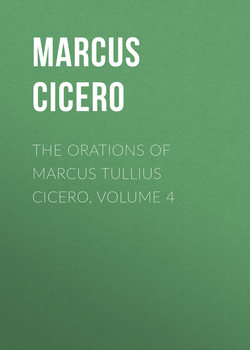The Orations of Marcus Tullius Cicero, Volume 4

Реклама. ООО «ЛитРес», ИНН: 7719571260.
Оглавление
Marcus Cicero. The Orations of Marcus Tullius Cicero, Volume 4
THE FIRST PHILIPPIC
THE ARGUMENT
THE SECOND SPEECH OF M.T. CICERO AGAINST MARCUS ANTONIUS
THE THIRD PHILIPPIC, OR THIRD SPEECH OF M. T. CICERO AGAINST MARCUS ANTONIUS
THE ARGUMENT
THE FOURTH ORATION OF M.T. CICERO AGAINST MARCUS ANTONIUS
THE FIFTH ORATION OF M.T. CICERO AGAINST MARCUS ANTONIUS
THE SIXTH ORATION OF M. T CICERO AGAINST MARCUS ANTONIUS CALLED ALSO THE SIXTH PHILIPPIC. ADDRESSED TO THE PEOPLE
THE SEVENTH ORATION OF M. T. CICERO AGAINST MARCUS ANTONIUS CALLED ALSO THE SEVENTH PHILIPPIC
THE ARGUMENT
THE EIGHTH ORATION OF M T CICERO AGAINST MARCUS ANTONIUS CALLED ALSO THE EIGHTH PHILIPPIC
THE NINTH ORATION OF M.T. CICERO AGAINST MARCUS ANTONIUS. CALLED ALSO THE NINTH PHILIPPIO
THE ARGUMENT
THE TENTH ORATION OF M.T. CICERO AGAINST MARCUS ANTONIUS. CALLED ALSO THE TENTH PHILIPPIC
THE ARGUMENT
THE ELEVENTH ORATION OF M T CICERO AGAINST MARCUS ANTONIUS. CALLED ALSO THE ELEVENTH PHILIPPIC
THE TWELFTH ORATION OF M T CICERO AGAINST MARCUS ANTONIUS. CALLED ALSO THE TWELFTH PHILIPPIC
THE ARGUMENT
THE THIRTEENTH ORATION OF M.T. CICERO AGAINST MARCUS ANTONIUS. CALLED ALSO THE THIRTEENTH PHILIPPIC
THE ARGUMENT
THE FOURTEENTH (AND LAST) ORATION OF M.T. CICERO AGAINST MARCUS ANTONIUS. CALLED ALSO THE FOURTEENTH PHILIPPIC
THE TWO BOOKS WHICH REMAIN OF THE TREATISE BY M.T. CICERO ON RHETORICAL INVENTION
THE SECOND BOOK OF THE RHETORIC, OR OF THE TREATISE ON RHETORICAL INVENTION, OF M.T. CICERO
THE ORATOR OF M.T. CICERO. ADDRESSED TO MARCUS BRUTUS
THE TREATISE OF M. T. CICERO ON TOPICS,
A DIALOGUE CONCERNING ORATORICAL PARTITIONS
THE TREATISE OF M. T. CICERO ON THE BEST STYLE OF ORATORS
Отрывок из книги
When Julius, or, as he is usually called by Cicero Caius Caesar was slain on the 15th of March, A.U.C. 710, B.C. 44 Marcus Antonius was his colleague in the consulship, and he, being afraid that the conspirators might murder him too, (and it is said that they had debated among themselves whether they would or no) concealed himself on that day and fortified his house, till perceiving that nothing was intended against him, he ventured to appear in public the day following. Lepidus was in the suburbs of Rome with a regular army, ready to depart for the government of Spain, which had been assigned to him with a part of Gaul. In the night, after Caesar's death he occupied the forum with his troops and thought of making himself master of the city, but Antonius dissuaded him from that idea and won him over to his views by giving his daughter in marriage to Lepidus's son, and by assisting him to seize on the office of Pontifex Maximus, which was vacant by Caesar's death.
To the conspirators he professed friendship, sent his son among them as a hostage of his sincerity, and so deluded them, that Brutus supped with Lepidus, and Cassius with Antonius. By these means he got them to consent to his passing a decree for the confirmation of all Caesar's acts, without describing or naming them more precisely. At last, on the occasion of Caesar's public funeral, he contrived so to inflame the populace against the conspirators, that Brutus and Cassius had some difficulty in defending their houses and their lives and he gradually alarmed them so much, and worked so cunningly on their fears that they all quitted Rome. Cicero also left Rome, disapproving greatly of the vacillation and want of purpose in the conspirators. On the first of June Antonius assembled the senate to deliberate on the affairs of the republic, and in the interval visited all parts of Italy. In the meantime young Octavius appeared on the stage; he had been left by Caesar, who was his uncle, the heir to his name and estate. He returned from Apollonia, in Macedonia, to Italy as soon as he heard of his uncle's death, and arrived at Naples on the eighteenth of April, where he was introduced by Hirtius and Pansa to Cicero, whom he promised to be guided in all respects by his directions. He was now between eighteen and nineteen years of age.
.....
To find fault with the rest of his actions, O conscript fathers, is difficult, and somewhat unsafe. He was occupied in war; he glutted himself with the slaughter of citizens who bore no resemblance to himself. He was fortunate—if at least there can be any good fortune in wickedness. But since we wish to show a regard for the veterans, although the cause of the soldiers is very different from yours; they followed their chief; you went to seek for a leader; still, (that I may not give you any pretence for stirring up odium against me among them,) I will say nothing of the nature of the war.
When victorious, you returned with the legions from Thessaly to Brundusium. There you did not put me to death. It was a great kindness! For I confess that you could have done it. Although there was no one of those men who were with you at that time, who did not think that I ought to be spared. For so great is men's affection for their country, that I was sacred even in the eyes of your legions, because they recollected that the country had been saved by me. However, grant that you did give me what you did not take away from me; and that I have my life as a present from you, since it was not taken from me by you; was it possible for me, after all your insults, to regard that kindness of yours as I regarded it at first, especially after you saw that you must hear this reply from me?
.....